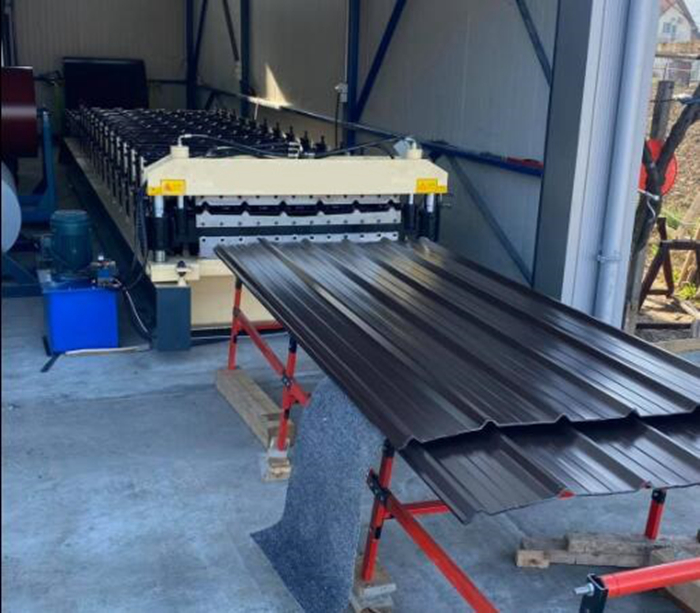Understanding the Different Types of Metal Roofing Machines
Understanding the different types of metal roofing machines is crucial for anyone involved in the construction or roofing industry. These machines have revolutionized how roofs are installed, offering efficiency, durability, and precision in metal roofing projects. This blog post explores the various types of metal roofing machines, their functions, and how they contribute to the advancement of roofing technology.
Introduction to Metal Roofing Machines
Metal roofing machines are specialized equipment designed to fabricate metal roofing panels and components directly on the job site or in a manufacturing facility. These machines take coils of metal sheeting and transform them into roofing panels, ready for installation. The ability to produce roofing materials on-site reduces waste, cuts transportation costs, and allows for custom-fit roofing solutions.
Roll Forming Machines
Roll forming machines are at the heart of metal roofing production. They progressively shape a metal sheet through a series of rolls, each performing incremental parts of the bending process, until the metal assumes the desired profile. These machines can produce a variety of roofing profiles, including standing seam, corrugated panels, and R-panels.
Types of Roll Forming Machines
- Portable Roll Formers: These machines are designed for on-site production, allowing contractors to produce panels as needed, directly at the construction site. Portable roll formers are ideal for custom-sized panels, reducing excess material and accommodating specific project requirements.
- Factory-Based Roll Formers: Larger and more complex than their portable counterparts, factory-based roll formers offer higher production speeds and more profile options. They are used in manufacturing facilities where large volumes of roofing materials are produced.
Tr20 Tr40 roof panel forming machine
Standing Seam Machines
Standing seam machines specialize in producing panels with raised interlocking seams. These seams are what differentiate standing seam metal roofs, providing a sleek appearance and superior leak resistance. Standing seam machines can be either portable or stationary, and some models offer the ability to apply seam caps in a continuous process, enhancing efficiency and consistency.
Corrugated Sheet Machines
Corrugated sheet machines produce metal roofing panels with a distinctive wavy pattern. This profile is known for its strength, durability, and ability to handle heavy rain and snow loads. Corrugated machines are popular in both residential and commercial applications, offering a balance between performance and aesthetic appeal.
Bending and Folding Machines
Bending and folding machines are used for creating precise bends and folds in metal panels, necessary for custom fittings and installations. These machines can handle various angles and configurations, making them essential for projects requiring detailed metalwork, such as flashing, trim, and edge metal.
Cutting Machines
Metal roofing requires precise cutting to ensure that panels fit perfectly on the roof. Cutting machines, including shears and saws, are used to trim panels to size. Some roll forming machines come equipped with integrated cutting systems, allowing for seamless production from coil to finished panel.
Seaming Machines
Seaming machines are used to join the edges of metal roofing panels, creating a watertight seal. For standing seam roofs, handheld or ride-on seamer tools are used after the panels are installed to lock the seams into place. These tools are essential for the integrity and longevity of a standing seam metal roof.
Punching and Stamping Machines
Punching and stamping machines are used to create holes and patterns in metal panels, necessary for fastening and decorative purposes. These machines can be standalone units or integrated into roll forming lines, providing flexibility in manufacturing processes.
The Importance of Choosing the Right Machine
Selecting the right metal roofing machine depends on several factors, including the type of roofing profile desired, production volume, and whether the production will be on-site or in a factory. For contractors and manufacturers, investing in the appropriate machinery can significantly impact the efficiency, quality, and profitability of roofing projects.
Conclusion
The variety of metal roofing machines available today enables the production of high-quality, durable roofing materials suited to diverse architectural styles and functional requirements. From portable roll formers to sophisticated standing seam machines, the right equipment can streamline production processes, reduce costs, and deliver superior roofing systems. As technology advances, we can expect further innovations in metal roofing machines, offering even greater efficiency and versatility in metal roofing construction. Understanding these machines’ capabilities and applications is key to leveraging the benefits of metal roofing, ensuring that projects meet the highest standards of quality and performance.









